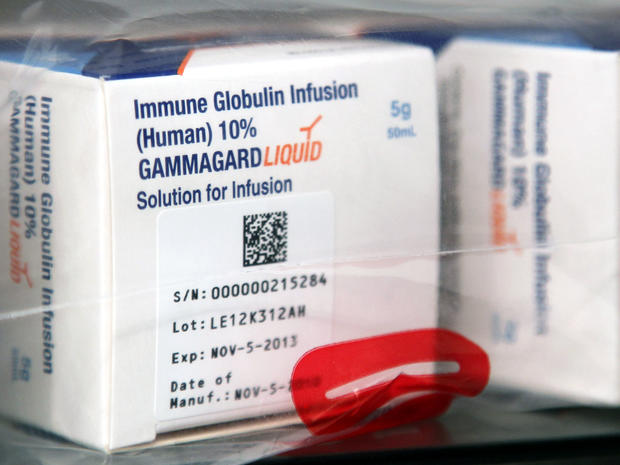Experimental Alzheimer's drug Gammagard may stall memory decline, small study suggests
(CBS/AP) Researchers are reporting for the first time that a treatment might help prevent Alzheimer's disease from getting worse for as much as three years, but caution that evidence is preliminary and the effect has been seen in a very small amount of patients.
The treatment is Gammagard, made by Baxter International Inc. Doctors say that four patients who received the highest dose in early testing showed no decline on memory and cognition tests three years later. A bigger, more comprehensive study of the treatment will give results within a year.
Watch: Fighting Alzheimer's with early detection
Slowed walking speed may be early predictor of Alzheimer's decline
Genetic mutation may protect against Alzheimer's, scientists find
The drug is a collection of antibodies from pooled blood donations given as infusions every two weeks. These antibodies may help clear the sticky plaque that clogs patients' brains.
The results were presented Tuesday at an Alzheimer's conference in Vancouver, British Columbia.
"Fortunately, improving detection technologies and updated diagnostic guidelines are enabling the detection of early changes in the brain and subtle cognitive deficits that are consistent with what is now known as presymptomatic (or preclinical) Alzheimer's," Dr. William Thies, Alzheimer's Association chief medical and scientific officer said in a written statement. "People in this stage of the disease are an ideal population for prevention trials to delay the onset or slow the progression of cognitive decline."
For the study, 24 patients received six months of treatment followed by 12-months of treatment with Gammagard, tested in several doses. Patients were also offered an additional 18-months of a standardized dose of Gammagard treatment to test the drug's long-term effects.
The researchers found that four patients who took the standardized dose of the drug for the 36 months reported the best outcomes, with no measurable declines in cognition, memory, daily functioning and mood. Eleven patients who took the drug for 36 months had "favorable" effects on their thinking abilities, behavior and daily function. Five of the patients who were initially treated with a placebo were switched to the drug experienced a less rapid cognitive decline.
"This is the first study to report long term stabilization of Alzheimer's symptoms with IVIG," study author Dr. Normal Relkin, an associate professor of clinical neurology and neuorscience at Weill Cornell Medical College in New York City, said in a statement. "While the small number of participants may limit the reliability of our findings, we are very enthusiastic about the results."
The treatment may also be costly. Relkin told HealthDay that treating a patient with Alzheimer's using this drug would likely cost between $2,000 and $5,000 every two weeks, with higher doses requiring higher costs.
